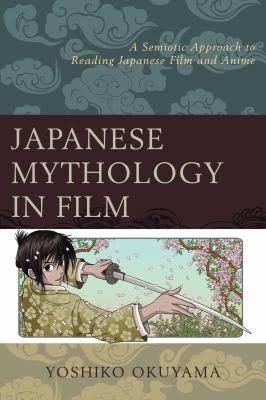I had to borrow this book as soon as I saw it because I took a class on Miyazaki Hayao’s films. That’s a very tenuous connection but I’m clinging on to it all the same.
Japanese Mythology in Film is an introduction to the study of Japanese culture through movies (both live action and anime). The author argues that semiotics can be used to uncover signs of Japanese mythology which in turn can be used to develop cultural or visual literacy.
First, a few definitions:
Semiotics is “the study of a system of signs to determine how symbolic meanings are created and transmitted through use of words, concepts, images, and so forth.” In other words, studying the meaningful words and pictures in the movie (at least in my understanding).
Mythology in this book is defined as “the stories and allegories of deities and humans, the afterlife, and natural phenomena and supernatural forces as well as to other myths and legends of the mainstream and folk religions of Japan.” So basically religious Japanese culture.
After explaining what semiotics is in detail and why it’s a valid way of analysing film, as well as the presence of mythology in film, the book goes on to analyse the following topics:
- Taoism and Shintoism in Onmyoji and Onmyoji II
- Folklore motifs in Spirited Away and Princess Mononoke (Obviously this was my favourite chapter)
- Buddhist and Folklore motifs in Dorito and Departures
- Eclectic myths in Mushi-Shi and Cyber mythology of Ghost in the Shell 2: Innocence
I’m only familiar with Miyazaki’s movies and I’ve watched a few episodes of Mushi-shi, but the book does a great job of summarising the movies so that I can understand the analysis (and it made me want to watch everything mentioned).
If I start to go into detail about what I learnt, I’d just end up summarising the whole book. Perhaps it’s because of the breadth of the work, but I felt that this book taught me more about Japanese mythology and culture than the Miyazaki module.
Because this book is aimed at undergraduates, the tone is academic. However, it is definitely not inaccessible and I would recommend this to anyone interested in Japan, myths, and/or cinema.
Wednesday, February 28, 2018
Subscribe to:
Post Comments
(
Atom
)


I think my husband might really be interested in this one as he loves anything related to Japanese films and myths.
ReplyDeleteOooh, in that case, I think he'd really enjoy it!
Delete